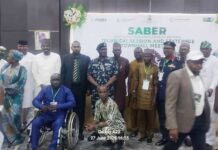FIC Report (Abia State) – A one day Town Hall Meeting by a Non Governmental Organization, Women Aid Collective (WACOL) for Women Groups and Stakeholders from the three Senatorial Zones has ended in Umuahia, Abia State with a call on government to intensify it’s current efforts in stamping out all forms of violence and discrimination against Women and the Girl child.
The Workshop was organised by the Women Collective and 50/50 Action Women in collaboration with Ford Foundation as part of the group’s efforts to change the norms and practices that promote violence against women and girls in Abia state.
The Founder of Women Aid Collective, WACOL, Prof. Joy Ngozi Ezeilo advised that any culture that recognises one gender above the other is unjust and should be done away with.
Ezeilo spoke at Ibeku High School, Umuahia, Abia State,represented by the WACOL Programme Officer and Head of Communications, Egodi Igwe, highlighting on the activities of WACOL geared toward promoting and protecting the rights of Women and young ones, called for the elimination of obnoxious norms and practices promoting violence against Women and Girls in Abia state.
It is on record that the Women Aid Collective (WACOL) is a non profit Civil Society Organisation, registered in Nigeria and operating across West Africa and globally. WACOL works in the past 25 years has gained local to global reputation as consistent advocates for the protection and promotion of the rights of persons especially the Women and young people.
The organisation also works in the area of social reforms, policy formulation and advocacy for the implementation of laws that promote the rights of Women and gender equality.
In a paper on the “Harmful cultural norms against Women and Girls, and its negative impact on community’ development”, a Resource Person at the meeting, a University Law lecturer from University of Nigeria, Enugu, Barr. Akachi Nworgu- Okonji, blamed underdevelopment of communities on some negative norms against Women and Girl child.
She stated that Cultural norms are rules or expectations of behavior and thoughts based on shared beliefs within a specific cultural or social group while another definition describes them as shared beliefs, or values and the human behaviors that support these values within a given society, such as the standards of conduct that are met with social approval or disapproval. Cultural norms and values been society’s expectations that are reflected in the attitudes and behaviors in a group of people should shape the behavioural pattern of human’s in that community as norm refers to the attitudes and behaviors that are considered typical or average for a social group while beliefs are often referred to as values. Norms support values. Norms are learned by what people say, think, and do.
She, however, opined that Cultural norms and values are passed down to people through their families, friends, and acquaintances with the expectation that they will be adopted by the person, which shapes society as a whole.
In her Lecture, Akachi Nworgu-Okonji, called for a more punitive sanctions for violence and discrimination against Women in the country maintaining that the current provision of two years imprisonment or option of half-a-million naira fine was grossly inadequate.
Barr. Nworgu-Okonji argued that the violation of the extant law on violence and discrimination against Women should be met with a more drastic and severe punishment.
She, therefore, proposed five years imprisonment or N1 million fine or both as against what obtained presently.
Continuing in her address, Nworgu-Okonji identified spousal battery, female genital mutilation, child marriage, disinheritance of women and economic discrimination as some of the negative traditional practices.
In her own words ,she enumerated some of the agelong discrimination as “Holding Offices: women do not hold political and religious offices for example there are no female Ezes, there are no female chief priests (Eze muo) and most shocking there is no female representation in the Abia state House of Assembly. So who becomes the chairperson on women’s matter in the house?
Economic Empowerment: not allowed to cultivate yams or enter yam barns, Women they do not climb trees, cut palm fruits or tap wine Widowhood Practices: A widow is to mourn her husband for at least six months, but it was not compulsory for the men to mourn their late wives. Widowhood practices, she must mourn her husband for 6 months and must have her hair shaved with razor blade. This same practice is not accorded to men who lose their wives etc.
Religious Activities: Women and girls have freedom to practice any religion of their choice as she must practice that of her husband. However, no female chief priest has never emerged in the community
Others include: Lack of power to make decision at home. Not allowed to present kolanut. They do not participate in masquerade ceremonies.”She attributed the general underdevelopment of most communities in the South-East to the prevalence of such negative norms against Women and the Girl child.
The United Nations defines community development as “a process where community members come together to take collective action and generate solutions to common problems”.
Community development seeks to empower individuals and groups of people with the skills they need to effect change within their communities.
She reiterated that Community development can be understood as a planned effort to build assets that increase the capacity of residents to improve their quality of life. These assets may include several forms of community capital: physical, human, social, financial, environmental, political, and cultural without exclusion of any gender.
The Law Researcher said that investigation revealed that gender-based violence causes more death and disability among Women between the ages of 15 and 44 than cancer, malaria, accident and war.
‘Marginalization of women’s right in the event of dissolution of customary law marriages: Women who are customarily married are not given any financial compensation in the event of divorce. Furthermore, they are also denied the right to custody of the children of the defunct marriage on the ground that under Igbo custom, children belong exclusively to men. It therefore automatically implies that a woman on dissolution of Igbo customary law marriage goes away empty handed, (no financial compensation and no children).
When a lady is impregnated outside wedlock, she is shamed. This is done by youths coming together singing ‘egwu nshi’ showing that they are angry. They chant into her family’s compound, cut all the trees in the compound, take the leaves and lay them on the floor to show she has committed an abomination (‘igbosa akwukwo’). This is also done to sing shame into the girl. This same practice is not extended to the man who impregnates the lady.
They don’t accept Women impregnated outside wedlock nor the child/children (called ‘ume’ –bastard) because accepting them will hinder the progress of the legitimate children.
Harmful traditional values and practices act as root causes for discrimination and violence against girls. Therefore the could be seen as forms of human rights violation.
People should not allow their cultural worldview to erode their well-being. This is because, the adaptation to cultural practice particularly the enshrined harsh practices, pose constraints which affects adversely the physical, mental, social, emotional, psychological health and integrity of individuals particularly women,’She said.
There was a consensus among the Participants that the Traditional Institutions including the Traditional Rulers (Eze-in-Council) and Village Maidens otherwise called the “Umuada” should take steps to discourage harmful traditional practices in their communities.
Nworgu-Okonji urged them to embrace the advocacy to end the negative traditional practices for their communities to progress with the present global reality.
“History would say thank you to our generation for re-rewrite the history of some of our cultural norms that negate women.
We can see that norms that limit Women or the Girl child promotes increased poverty level and psychological effect such as low self esteem and lack of confidence, subsequently affecting poverty reduction and Women empowerment negatively. Reduction of income, revenue of the community.
This ultimately results in low efficiency of labor leading to low productivity in agriculture. Eg when a woman cannot plant yam or cannot climb trees.”
According to her, “if they can embrace change in technology, why would they not embrace change in culture? “Change is constant and when it comes, we should be ready to accept it,” she said.
She said that aside from the National and State policies, there were no deliberate community actions and bye-laws to end Gender-Based Violence and harmful traditional practices.
The Workshop, therefore, charged the Traditional Rulers and their Eze-in-Councils to come up with community bye-laws and coordinated interventions to protect Women’s rights.
It also advocated equal rights for both the boy and girl children in educational opportunities, family inheritance and economic empowerment.
It specifically urged families to give the Girl children good education and basic hands-on skills in order to make them self-reliant and beneficial to their family and community.
The Workshop further advocated for the sensitization and mobilization of men to play the role of change agents.
Also in another paper on the “Strategies towards ending harmful norms that promote violence against Women and Girls: the role of Stakeholders”, Pastor Wilson Alamba, however, made case for parents to train their girl child in acquiring basic skills and education to make them self-reliant and profitable both to their parents and community too.
He advised men to cultivate the culture of writing their wills to avert family crises during the sharing of their property after their death.
It was also advised that existing Legislations, including the Child’s Right Act, Violence Against Persons (Prohibition) Act amongst others could be used to end violence against Women and the Girl child.
The interactive event commended the Wife of the State Governor for empowering our Women economically to enable them pull out of the poverty level and become self-reliant enough to stand up.
A few of the projects She carried out include providing homes for indigent Women through our Widows & Indigent Shelter Scheme.
Organised Women into clusters of traders set in rural areas. Built conducive market places for them and gave them funds to start business or expand the ones they are already doing. This was done in Osisioma, Ikwuano, Abiriba, Isuikwuato, Obingwa, Isiala Ngwa North, and Isiala Ngwa South.
Another commendation is the Governorship Candidate of the All Progressives Congress (APC) in Abia State, Chief Ikechi Emenike who has announced a woman as his running mate, Rev Gloria Nanya Akara from Ukwa East Local.
The Participants included Traditional Rulers/Legislators, Customary Court Officers, Religious Leaders, 50/50 Action Women, Women and Men President Generals, Umuada, Ugoeze, Youth Male, Youth Female, Media, LGA Women Development Officers (WDOs).
Onyebuchi Juliet Nwabu
Social Affairs Coresspondent
FIC, Umuahia, Abia State.





